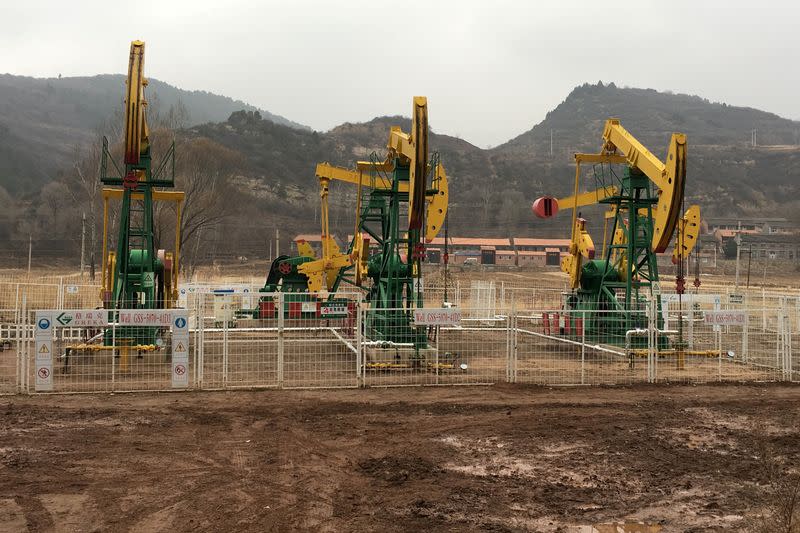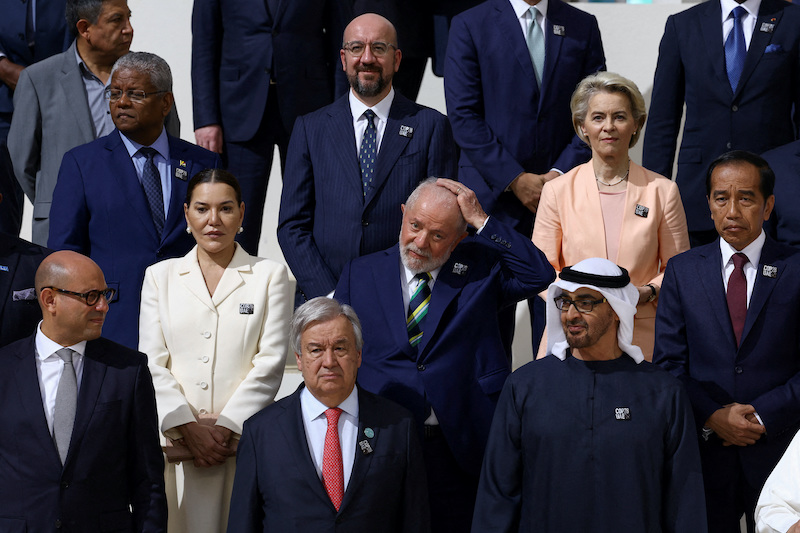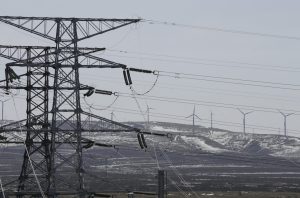Over half the world’s countries have agreed to triple their installation of renewable energy – and a push is on for other states to stop the rise of emissions heating up the planet.
A swag of energy announcements were unveiled at the UN climate summit in Dubai on Saturday, but the pledge to triple installed renewable energy systems by 2030 was perhaps the most positive news, both in terms of the support it has won from more than 110 countries, but also because some are pushing to make the deal global by the end of the UN conference.
The European Union, United States and COP28 host the United Arab Emirates have been rallying support for the pledge as a means to bring about the sharp drop in planet-warming emissions needed this decade to avoid unleashing more severe climate change.
“More than 110 countries have joined already,” European Commission President Ursula von der Leyen told the COP28 summit on Thursday of the renewables pledge. “I call now on all of us to include these targets in the final COP decision.”
ALSO SEE: US Pledges $3 Billion for Green Climate Fund at COP28

Whether governments and companies will rally the huge investments needed to hit the goal is an open question.
While deployment of renewables like solar and wind has been surging globally for years, rising costs, labour constraints and supply chain issues have forced project delays and cancellations in recent months, costing developers like Orsted and BP billions of dollars in writedowns.
Getting the deal into the final UN climate summit decision would also require consensus among the nearly 200 countries present. While China and India have signalled support for tripling global renewable energy by 2030, neither has confirmed it will back the overall pledge – which pairs the ramp-up in clean power with a reduction in fossil fuel use.
South Africa, Vietnam, Australia, Japan, Canada, Chile and Barbados are among the countries already on board, officials have said.
The renewables pledge was among several other energy-related announcements at COP28 on Saturday, including new measures and funding to combat methane emissions, agreements to cut coal use and the promotion of nuclear energy.
Nuclear push
More than 20 nations signed a declaration on Saturday aiming to triple nuclear power capacity by 2050, with US climate envoy John Kerry saying the world cannot get to “net zero” without building new reactors.
“We are not making the argument that this is absolutely going to be the sweeping alternative to every other energy source,” Kerry said during a launch ceremony at COP28.
“But … you can’t get to net-zero 2050 without some nuclear, just as you can’t get there without some use of carbon capture, utilisation and storage,” Kerry said.
Global nuclear capacity now stands at 370 gigawatts, with 31 countries running reactors. Tripling that capacity by 2050 would require a significant scaling up in new approvals – and finance.
Saturday’s declaration, signed by France, Belgium, Britain and South Korea, also commits the countries to taking action to mobilise investment for the sector.
Call for phase down of coal, oil and gas
A central decision facing nations at COP28 is whether to agree, for the first time, to gradually “phase out” global consumption of fossil fuels. Burning coal, oil and gas to produce energy is the main cause of climate change.
A draft of the renewable energy pledge calls for “the phase down of unabated coal power” and ending the financing of new coal-fired power plants.
Tripling clean sources like wind and solar and doubling energy savings would deliver 85% of the cuts in fossil fuel use needed this decade to meet global climate goals, according to an analysis by think-tank Ember.
The goals will add to pressure on wealthy nations and international financial institutions to unleash the massive investments needed to hit 11,000 gigawatts of renewable energy by 2030 – in particular, by reducing the high cost of capital that has stymied renewable energy projects in Africa and other developing nations.
“The mismatch still exists between our potentiality and our limitations to attract investment,” Najib Ahmed, a consultant at Somalia’s climate ministry, said.
Africa receives just 2% of global investments in renewable energy. Somalia has the highest onshore wind power potential of any African country, yet one of the lowest electrification rates in the continent, according to the International Energy Agency.

Deep pockets to fight methane emissions
While many of Saturday’s expected announcements centred around sourcing power into the future, nearly a dozen deep-pocketed philanthropic institutions set their sights on one of the key climate pollutants – methane emissions.
The philanthropic groups, which include the Bezos Earth Fund, Bloomberg Philanthropies and the Sequoia Climate Foundation, said they would invest $450 million over the next three years to help countries launch national plans for tackling methane, the second-biggest cause of climate change after carbon dioxide.
The United States, UAE and China are also expected to make announcements tied to raising more finance toward the effort.
Cities need more funding: Study
Meanwhile, cities are receiving only a fraction of the climate finance they need, especially in low-income countries, according to a study published on Saturday on the sidelines of the COP28 climate talks.
The Cities Climate Finance Leadership Alliance (CCFLA) said cities are on the front line of climate hazards and responsible for three quarters of global emissions, but multilateral development banks (MDB) needed to adopt new strategies to address a gaping financing gap.
Cities were receiving only 1% of the climate finance they required, which is estimated to be as high as $5.4 trillion per year up to 2030, according to the study, the first ever review of urban finance from major multilateral development banks.
The proportion of MDB financing dedicated to urban-related climate projects stood at $62 billion from 2015 to 2022, or 21% of the total, despite rapid rates of urbanisation across the globe, the study said after analysing data from 815 urban climate-related projects financed by MDBs over the period.
Though they are among the most climate-vulnerable, cities in sub-Saharan Africa, the Middle East and North Africa received an especially low share of urban climate finance, with the study citing issues like creditworthiness and restricted access to capital markets.
It called on development banks to make more concessional funding available in order to de-risk investments.
- Reuters with additional editing by Jim Pollard
ALSO SEE:
US Pledges $3 Billion for Green Climate Fund at COP28
Cities Lead COP28 Climate Change Push as Nations Fail to Deliver
China Seen Installing 230 GW of Solar & Wind Power in 2023 – PV
Summit Leader ‘Using COP28 to Promote Fossil Fuels’ – NYT
COP28: France, US to Seek Ban on Private Funds for Coal Plants
























